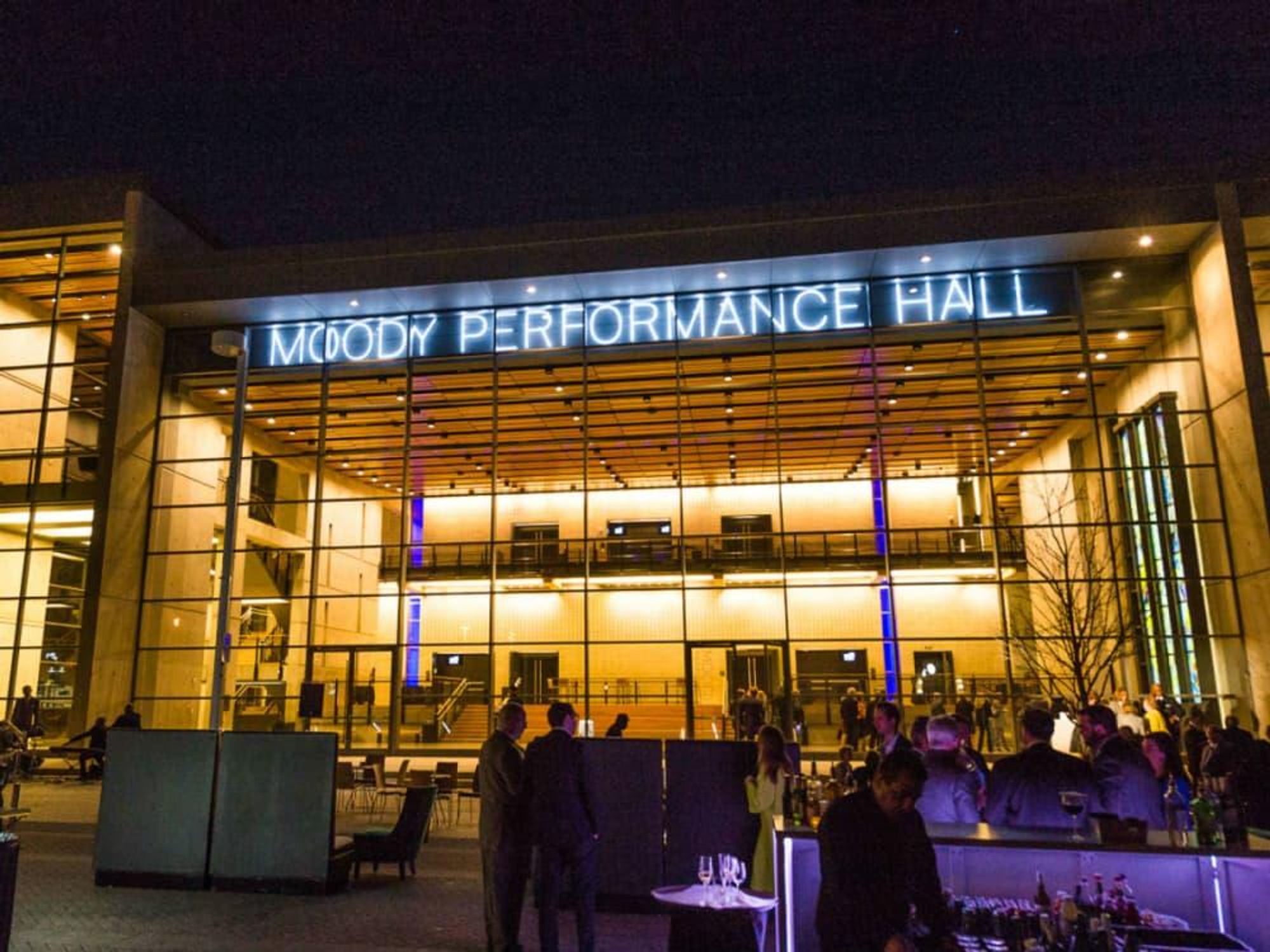Gifts and Grants
Generous gift to Dallas' performing arts center comes with a bonus — and strings

The AT&T Performing Arts Center is getting some much-needed assistance in paying back its massive debt, and in return, one Dallas Arts District building might be getting a name change.
The Galveston-based Moody Foundation has offered to pay $12 million toward the $27 million that ATTPAC needs to raise to pay off its capital debt, the Dallas Morning News reported on April 10. The foundation has also pledged a bonus $10 million gift for all Dallas arts groups — with one condition.
To receive the $10 million, which would be in the form of "flexible grants" to "small and emerging" Dallas arts groups, Dallas would have to acknowledge the Moody Foundation's gift by renaming Dallas City Performance Hall in its honor. SMU's Moody Coliseum already carries the name, as does Moody Gardens in Galveston and the Moody College of Communication at the University of Texas at Austin.
Final approval of the name change to Moody Performance Hall would come from the city, and there will be further discussion at a special briefing of the city's Cultural Affairs Commission on April 13.
"Thanks to the Moody Foundation endowment, small arts organizations throughout the city will know there is some level of funding regardless of our city budget situation," Mayor Mike Rawlings says in a statement to the Dallas Morning News. "For an institution with the stature of the Moody Foundation to recognize both the need and potential, and then find a way to fulfill it with this endowment, is remarkable."
The director of the city's Office of Cultural Affairs, Jennifer Scripps, agrees, telling CultureMap that the grants are for "all groups whose operating budgets are under $1 million, not just those who use the Dallas City Performance Hall. Whether you're out in a neighborhood teaching art to kids or performing in a tiny black box theater, you're eligible."
Ever since the AT&T Performing Arts Center announced in June 2016 that it was struggling with $151 million in debt, accrued during its construction and from the loans' subsequent interest, there have been controversial ideas proposed about how to pay it back.
First ATTPAC requested that the city of Dallas help them out, writing $1.5 million a year for the next 10 years into its budget. That resulted in a September rally known as Art Equity Now, where nearly 70 artists and arts supporters gathered outside Dallas City Hall to voice their displeasure. According to the city's cultural policy, the money given to ATTPAC is required to be matched, with those funds being given to ethnically specific entities. And a lot of people thought that the services ATTPAC provides doesn't equal $15 million.
Cara Mía Theatre Co. artistic director David Lozano was a vocal presence during the protest, where he maintained that bailing out ATTPAC created class divisions in the Dallas arts community.
"On the surface, this is positive," he tells CultureMap. "ATTPAC was able to leverage funding for small and mid-size arts groups, and the presence of the Office of Cultural Affairs' director on the executive committee of the Moody Fund for the Arts that will parcel out these funds is positive. I trust that the OCA director will champion equitable funding and resources for small and mid-size organizations in need."
But he's not 100 percent on board.
"On the other hand, the issues that I struggle with are the same that I continue to struggle with since the bailout last summer," he says. "ATTPAC seems to continually work at the levels of the city council and city management instead of having to go through the OCA and the Cultural Affairs Commission like the rest of us.
"Also, how does ATTPAC have the power to solicit a donor for a city building it doesn’t even manage? Clearly, ATTPAC has access and influence to raise big money that the rest of us small groups do not, and in this case, some of us will benefit.
"Still, it’s a hard pill to swallow that the chair of the board of ATTPAC will handpick the board of directors of the Moody Fund in exchange for the gift to this city building. I suppose we have to take what we can get and have faith that the OCA will fight for the small groups and groups of color when the grant process begins."
Former South Dallas Cultural Center manager Vicki Meek told CultureMap, "This is a very generous gift that will ultimately benefit many of the small and mid-sized cultural organizations in Dallas."
Like Lozano, she's hoping that the gift lives up to its promise.
"I hope the City Council doesn't use this gift as an excuse to not increase the city's financial commitment to its cultural community," Meek says. "Private and foundation funding should never be a substitute for a public commitment to the arts. Priorities change, justifiably so, for foundations, so the sustainability of a healthy arts ecosystem must be the responsibility of city government whose citizens pay taxes for city services."
Teatro Dallas co-founder Jeff Hurst doesn't see why the Moody Foundation should tie its funding to ATTPAC in the first place. He compared the grants to "Walt Humann’s Fair Park deal," saying that it's "patronizing and ultimately a smoke screen to simply give more money to ATTPAC while pretending to help the rest of us."
"Small arts organizations have consistently talked about the need for art in the neighborhoods, and this proposal does nothing to address that," Hurst says. "Capitalizing on the city-owned land and seed money in place for Phase Two at the Latino Cultural Center, to design and build a prototype neighborhood performing arts center that would be useful and affordable for those groups — and could be replicated around town — would be an example of something the Moody could do if they were truly interested in small arts development."
JP Morgan Chase and Bank of America forgave ATTPAC of $45 million, and ATTPAC used all of its cash reserves to pay another big chunk of $56 million. ATTPAC vowed to pay another $8 million from previous fundraising pledges and $27 million through future fundraising, which independent research says is the capacity of their fundraising capabilities.
ATTPAC's vice president of external affairs, Chris Heinbaugh, told the Dallas Observer last year that even after trimming operations, there was no way the center would be able to pay back the loan on its own.
"We realized we weren’t going to be able to fundraise our way out of it, and we weren’t going to be able to earn our way out of it," Heinbaugh said. "We could have just sat there and let this problem go on down the road for years. But Doug [Curtis, president and CEO of ATTPAC] said, 'We're not kicking this down the road for future generations, for future City Councils to have to deal with it.'"
ATTPAC and OCA have explained that the Moody Foundation grants will "only be awarded to small nonprofit arts groups with annual operating budgets of less than $1 million that are current or previous fiscal year recipients of City of Dallas Office of Cultural Affairs funding." No grant will exceed $25,000.
The $10 million will be doled out by the Moody Foundation at $1 million a year over a decade, with granting capacity at $100,000 during the first year, $125,000 during the second year, $150,000 during the third year, and "subsequent years of growing continuing until the endowment is fully vested." Once that happens, the proposal notes, "the fund has the capacity to provide the Dallas arts community with $400,000 a year in grants."
The AT&T Performing Arts Center opened in 2009 and encompasses the Margot and Bill Winspear Opera House, Dee and Charles Wyly Theatre, Annette Strauss Square, and Elaine D. and Charles A. Sammons Park.
